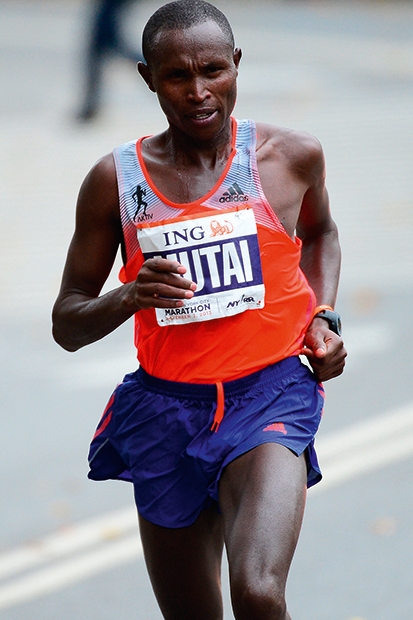Two Hours is a kind of Hoop Dreams for runners. Ed Caesar follows a handful of Kenyan marathoners, tracks their races and careers, and talks to them about their lives. Part of what’s moving about the book is the sense you get that these athletes (the children mostly of subsistence farmers from the Rift Valley in East Africa, who sometimes had to break rocks to pay for their primary schooling) were born with an inheritance as rich as any Notting Hill trustfunder’s — except that instead of stock options and the deeds to a house they have inherited a series of genetic codes which give them long, light legs and an extraordinary capacity to burn oxygen efficiently.
At least, that’s one way of telling the story:
What’s so intriguing about Kenya’s success at long distances, and what makes the scientists who study the reasons behind that success so excited, is that their champions almost uniformly hail from one tribe: the Kalenjin.
Caesar quotes from David Epstein’s book The Sports Gene, which puts their success down to a curious historic combination of facts. The Kalenjin are originally a valley tribe who have moved up recently into the mountains, so they combine the lung surface area of people born at altitude with the ‘sea-level ancestry’ that allows their haemoglobin to respond quickly to training at elevation.
And yet gene science hasn’t managed to prove the nature side of this argument — at least not yet. The consensus seems to be, we don’t have enough information, and some of the smart money is on nurture, too. Culture plays a large part in all this. Kenyans themselves seem to take a democratic view of their success. It’s a peculiarity of Kalenjins, says one European coach, that they possess utter faith that ‘anybody can run — it’s only a question of training.’
Regardless of the reason, what’s happened in Kenya in the last half-century, ever since Wilson Kiprugut won bronze in the 800m in the 1964 Tokyo Olympics, has been a kind of gold rush: towns, people’s lives, a micro-economy, have been shaped by the discovery of an unpredictable source of wealth. ‘In the village of Iten, in the forest of Kaptagat, and in the backroads of Kapsabet, the dirt roads teem with young men and women, running in groups. They train twice or three times a day. There are few joggers; casual running barely exists.’ But it’s a funny kind of gold rush, since it rewards an almost monk-like humility and willingness to tolerate pain. Millionaire athletes live in simple huts, breakfast on chai and a piece of bread, run over the unpaved hills at dawn, and again at nine, and later in the day. . . sleeping as much as they can, sometimes watching a movie in the evening.
Like any good book about sports, Two Hours is also a book about other things. What frames it is the quest, if you can call it that, for the first sub-two-hour marathon — and the question of whether such a time is even possible. This allows Caesar to talk about the history of the marathon, its roots in Greek mythology, various famous races, the role of money and science and drugs (Alberto Salazar, Mo Farah’s coach, makes a brief appearance), not to mention technology and shoe companies.
At the centre of the picture stands Geoffrey Mutai, who survived poverty, civil war, teenage hopelessness (the beginnings of a drink problem) and a difficult relationship with his father to become a four-time major marathon champion and the breadwinner and paterfamilias for a large network of dependents. In 2011 he ran the fastest marathon in history at the Boston marathon, in the ungodly time of 2:03:02 — which equates roughly to 460 16-second 100-yard dashes.
Yet in spite of Mutai’s extraordinary success, the tone of the book is very far from triumphant; one gets, more strongly than anything else, the sense of missed opportunities. For reasons to do with the topology of the course, his Boston marathon time doesn’t count as a world record. And he’s running out of chances to match it. A marathoner’s peak is extraordinarily brief. Training carries the constant threat of injury. You can race only a few times a year. And the races themselves depend on so many factors outside the runner’s control — pace-makers, cramps, the competition, the weather. So that the dream of a sub-two-hour marathon is really a dream about something else — what humans can accomplish unfettered by contingency.
Runners have in almost its purest form an athlete’s detached, yet deeply invested relationship to the self. At 15 miles, at 20 miles, over the final stretch, the marathoner has to ask his body, again and again — what can you give me still? And even though that body represents everything they are and have worked for, this doesn’t make it any less of a you. Somehow, whatever the answer turns out to be, they have to live with it.






Comments